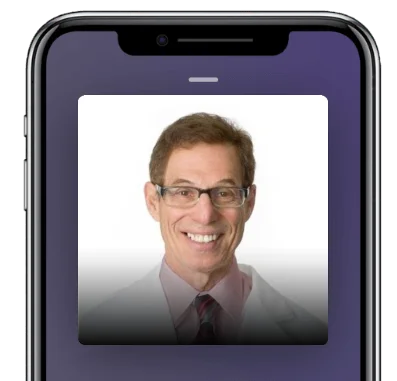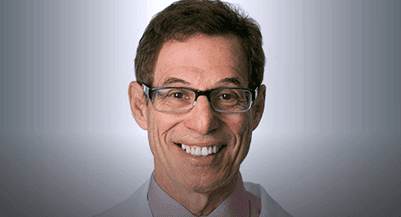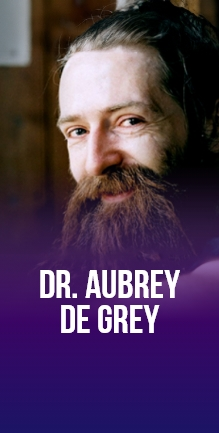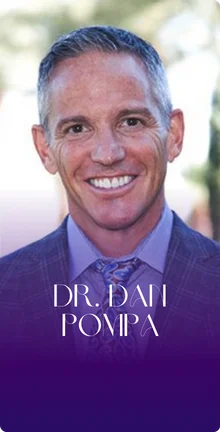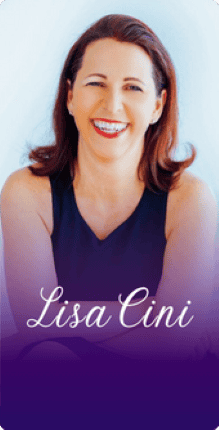Thanks so much, Stephan. It’s really my pleasure and my honor to be here with you. I look forward to sharing some ideas together.
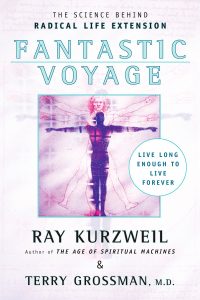
First of all, how did the book Fantastic Voyage come together? Because Ray is a busy guy, and you must’ve really impressed him for him to decide to do a book together.
I think it’s worth spending a minute or two going through this history. Ray and I have actually written two books together and Fantastic Voyage was the first one, and then we wrote a follow-up one called Transcend. It was actually at a Foresight Conference in 1999 and Ray—who I did not know at the time—was standing in the lunch line, speaking with a colleague about some nutritional supplements and things like that. Ray’s a big fan of nutritional supplements and that’s kind of my bailiwick towards my medical practice as a nutritionally-oriented doctor. I kind of butted in their conversation, and I disagree with the things he said, and this didn’t go over that well. But Ray eventually checked some things out and called me up, and said, “Hey, I’d actually like to talk to you some more. Would you want to evaluate me as a patient?”
He came out to my office in Denver and established a doctor-patient relationship. Ray’s an inquisitive guy. I mean, I’ve never had a patient like him in my entire life. He asked a lot of questions and it actually turned out that, two years later, we had sent back and forth 12,000 emails to one another.
One day, I said, “Ray, you know there’s so much stuff we’ve covered the ground of. Why don’t we put it together into a book?” Well, that’s something’s Ray really good at, he’s really good at organizing stuff. He says, “Well, let me take a look at it and see what I can do.” He organized our emails into different categories and it really was just a matter of flushing it out and that was the beginning of the Fantastic Voyage.
Wow. That is amazing.
Fantastic Voyage was written between 2002 and it was published in 2004. Ray and I, in the course of that, became friends and had been friends ever since.
Very cool. That reminds me of something I learned not too long ago about how to compartmentalized and repurpose intellectual property because a lot of stuff, all of our juice and our brilliance ends up in things like emails, on the back of envelopes, in the comments in Asana or whatever project management tools are. They don’t make their way into things like books, presentations, keynotes, etc.
I learned of this thing from Matt Church called the Pink Sheet. It’s a way of compartmentalizing or documenting your IP in chunks. You have a metaphor, you have an idea, you have the format of it, case study, or personal story, etc. I’ve started doing this. It’s really valuable because it’s like you have this Rolodex of all your IP. Instead of having 12,000 emails to dig through, you just have all these Pink Sheets. Like a Rolodex, you just pick these different Pink Sheets out and assemble them into your next keynote presentation or your next book. You might want to check that out.
That’s a wonderful idea. I wish we had that back in 2002. Ray has become incredibly busy with his duties at Google, plus he’s writing several other books. My own practice is very busy and I’m working in Thailand. We’ve gotten pretty busy, but maybe with some tools like you’re describing, writing another book together would be a much simpler process.
I’ll send you the Pink Sheet template for future use. You mentioned you’re really deep into supplements, a lot about them. I recall hearing that Ray takes on the order of like a hundred and some supplements per day. Is that true? What do all these supplements do and why should we consider taking some of these?
Ray is a very inquisitive and is kind of a believer in aggressive supplementation. He has his own genetic risk factors in terms of his family history. He has identified the number of nutritional supplements and dietary interventions that he could take to optimize his health. That’s what he’s done. It turns out that in order to accomplish his goals, he needs a lot of supplements. He does take quite a few every day. I have to admit I take my own share.
Getting old is normal but aging is not. Share on XI think most people don’t need to take that many supplements, but given the fact that if you actually do testing on people and you measure level of micronutrients—things like magnesium, chromium, manganese, and whatnot—it turns out that 9 out of 10 Americans, and we’re among the best-fed nation on earth, are deficient in at least one nutrient or vitamin or things like that. In order to measure all of their levels, will cost thousands of dollars. So, the simplest thing to do is just spend a few pennies a day and take some multiple vitamins and minerals.
I went and gotten stem cell procedure done, stem cell therapy from Dr. Harry Adelson and Amy Killen in Park City, Utah and they gave me kind of a recommendation to take nitric oxide boosting lozenges on a daily basis from here on in. So, I’ve been taking that ever since. Neo40 is the name of it. That is one example of a supplement that I learned about within the last two years.
I take CytoDetox. I had Dr. Dan Pompa on the show, as well as Dr. Harry Adelson and Amy Killen. CytoDetox from Dr. Dan Pompa. I take Restore for my gut biome every day. I haven’t had Zach Bush on the show yet, but I’m hoping to. I’m not taking Metformin, but I understand that Ray takes a pretty big dose of Metformin every day not for diabetes, but for longevity reasons. Is that something that you’d recommend?
Metformin is a diabetes medication, it’s FDA approved. It’s actually the most prescribed medication for Type 2 diabetes in the world. Tens of millions of prescriptions and hundreds of millions of doses are taken every year of this medication to treat diabetes. Studies have shown that Metformin activates the same pathway in the human body that fasting does. We know that of all of the interventions that have been looked at for increasing longevity, the one that was first found to have the most efficacy was reducing calories. When they reduced the calories of animals, they were able to show that in every species of animals, they really increased their longevity significantly.
The problem is, for humans, it’s difficult to do serious calorie restriction. We’re talking about 30–40% lesser calories and to do that, people, in general, are hungry all the time. They look very gaunt. Their body temperature is quite cold. Maybe the tradeoff is to live a few more years but it certainly seems like you didn’t.
It’ll drag on.
That’s right. For most of us, that’s not an attractive option. When they did some studies, it showed that there are some longevity genes in the human body. They compared the number of longevity genes that were expressed by Metformin, and they compared them to the number of longevity genes that were expressed or upregulated by fasting or caloric restriction, and metformin upregulated even more. I gave a lecture about this topic to the CR Society International, and at the end of the lecture, the president of the society came up to me and said, “Would it be possible for me to get a prescription for Metformin?” Even the hardcore calorie restriction people are beginning to look at Metformin.
Another thing in addition to improving longevity, you give Metformin to mice for instance in their drinking water, they’ll live 37.8% longer – it’s very significant. They’ve begun to repurpose metformin not just for the treatment of diabetes, but for the prevention and treatment of cancer because cancer cells, by large, can only eat one food and that’s sugar. Metformin interferes with the cancer cells’ ability to access its only food, so it helps to starve it. Similarly, we’re all forming cancer cells in our body every day, so by taking Metformin, we’re able to reduce our risk of cancer very significantly.
There are so many reasons that I think Metformin should be added to the drinking water of the public or certainly, if we can’t do that, at least we should be thinking about this very inexpensive medication that is safe and if it’s dosed and taken properly, it’s free of side effects. In fact, even the National Institute on Aging is in agreement and they have sponsored a study in the use of Metformin as the first anti-aging medicine. They’re beginning to look at aging as a disease, which anti-aging physicians like myself, basically feel that getting old is normal but aging is not. They’re a bit willing to look at aging as a disease, and the first drug they’re looking to treat is Metformin.
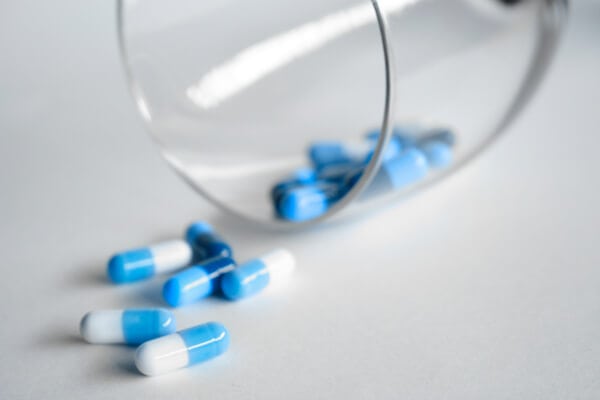
That is just really exciting. I should preface this by saying, listeners, don’t treat this as medical advice. Consult your doctor. Don’t sue us.
This is not medicine. We’re not practicing medicine here; we’re just going over general things that have been found in the research.
Yes, exactly. I remember watching a documentary about caloric restriction or CR. I was shocked to see that the guy that was being interviewed—he was preparing a meal—and he was peeling off the peel of the apple to eat that alone, and throw the rest of the apple away. I thought, “Wow, that sounds like a horrible life. I’m not going to do CR.” But then I heard about intermittent fasting, not a replacement, but an alternative that gets a lot of the benefits as well. Are you practicing intermittent fasting yourself?
Well, I recommend that to everybody—all my patients and myself. Do a minimum of 12 hours of fasting every day. Obviously, the easiest time to do that is when you’re sleeping. When I finish eating supper at night, let’s say, [6:30] PM or [7:30] PM, whatever it is, I don’t consume any calories until at least [6:30] or [7:30] in the following morning. During that 12-hour period, you’re allowing your insulin levels very low.
Insulin is a hormone that is made by our bodies that helps us store fat, and has a lot of good purposes for us to get through the next famine. But having a lower insulin level is something that we can do to expand both our youthfulness and our lifespan. We want to do a minimum of 12 hours a day of fasting. If we can go a little further, move it up to 15-16 hours, this is what’s referred to as the 16/8 program.
You eat for 8 hours a day. Basically, let’s say from 11 AM to 7 PM. The other 16 hours a day you don’t eat. Basically, you just skip breakfast. This allows the insulin level to drop even further and has greater benefits. I try to do one or the other, either the 12-hour to the 15- or 16-hour fasting every day. I recommend that everybody do that because that’s very doable. It’s fasting and caloric restriction made simple and it’s something that has enormous health benefits without any drastic interference with your lifestyle.
Yet that conflicts with some other people’s advice who say breakfast is the most important meal of the day. Never skip it. Or they advise to eat breakfast like a king, and lunch like a prince, dinner like a pauper and that sort of thing. There’s lots of advice out there around when and what to eat.
Obviously, we have 7 billion people on earth and each of them has their opinion. You’re going to get a conflict on anything, there’s not a surprise there. A lot of the ideas that breakfast is the most important meal, come from traditional Chinese medicine. If you want to do the 16/8 program you can just eat breakfast and lunch and then you start your fasting after that, in which case you have the best of both of those worlds. These are not mutually exclusive.
You alluded to Metformin as not a cure but a potential helper for avoiding cancer. What are some other things that our listeners need to know about cancer? You said that everybody has cancer cells in their bodies. I presume immune systems are taking care of those for the most part and when that fails then we end up developing cancer and tumors. Likelihood of dying by cancer or by heart disease is extremely high. Those are the number one and two killers.
Cardiovascular disease, heart attacks, and strokes are the number one and slightly behind is cancer, which is number two. Those diseases are the cause of over 55% of all deaths. If we’re able to make significant end-rows in reducing our risk of heart disease and cancer, then that will lead to considerable increases in longevity. The way that Ray and I wrote that in our books is we talked about both early detection and prevention. Obviously, prevention is the best of the two. I mean, I certainly would prefer to prevent heart disease all together than detect it early and similarly with cancer.
We are now able to detect heart disease and cancer at a much earlier stage than we’ve ever been able to before. By using some of the tools that are online now and the prices are coming down to very affordable levels, doing these on a regular basis, I think that we will be able to detect these diseases in an extremely early stage, and then we can take some lifestyle measures to prevent them.
Our genetic code hasn’t been updated as quickly as the software in our cellphones. It’s about 40,000 years out of date. Share on XOne of the lifestyle measures we’ve already talked about with cancer is basically taking Metformin. Similarly, we mentioned that cancer cells could only eat sugar, so it seems like a logical conclusion. In our books, Ray and I referred white sugar as the white Satan. I think that trying to reduce our consumption of sweetened foods, dessert foods, and sweetened soft drinks is one of the ways that you could starve cancer cells. That could help prevent cancer or if you have cancer, it could help your body to overcome it. Just those two things are really simple lifestyle interventions that people can do – drastically reduce your consumption of simple sugars and consider taking Metformin. Certainly, the first one you can do by yourself and the second one is worth having a conversation with your doctor.
Cutting sugar out of your diet as much as possible is so valuable in many different fronts not just for an anticancer sort of regimen, but just overall help. I’ve heard sugar referred to as the white devil before. I had a whole episode dedicated to sugar and how to cut it out of your diet or at least reduce it with JJ Virgin because she has a whole book on that.
That’s a great episode to check out if you’re interested in cutting sugar. I used to be a sugarholic. I’ve eaten so much sugar in the earlier part of my lifetime. Only in the last few years that I severely reduced it, I cut out all desserts from my diet except on holidays. I occasionally slip on that, but it’s not like every other day. It’s like maybe a few times a year I’ll slip and have sugar in the form of desserts other than on holidays.
People are either abstainers or moderators. I learned this from, I don’t remember who, but it really helped me because I’ve recognized that I am an abstainer. It’s all or nothing for me. I can’t just have one cookie, I have to have the whole bag. Some people, no problem. They can have one cookie and they’re done. Not me, so it’s got to be out of sight, out of mind, or I just have to be super strict about it and say, “I don’t need dessert. I just don’t.”
Sugar is addictive. It comes from some genetic coding that was written during the Stone Age. Because during that era, the early humans were living on the verge of starvation all the time. It made sense to eat sugar whenever possible because sugar can do one of two things in the human body. It cannot be stored. We don’t have any significant ability to store sugar, just a few teaspoons. You either burn it right away, which is to say if you were in the Stone Age, you can run fast, which is a good thing to do to catch an animal or get away from an animal, or you can store it, but not as sugar as fat, which will help you get through the next famine. Eating sugar made a lot of sense, it confers to survival advantage to our ancestors.

Unfortunately, our genetic code hasn’t been uploaded quite as quickly as the software in our cellphones. It’s really about 40,000 years out of date. We have to realize that while our genetic tells us to eat sugar every chance you can get. This is not a good thing to do given our current lifestyle circumstances where we have sugar available to us all the time. People 40,000 years ago had access to very little sugar, so when they ate what was available to them, they have the survival advantage conferred. Nowadays, with sugar every chance we get, this leads to epidemic obesity where 67% of the adult American population is either obese or overweight. Obesity is the number one and overweight being number two.
What’s the difference between obesity and overweight?
It has to do with body mass index. As a general rule of thumb, if you’re more than 30 or 35 pounds overweight, you’re probably obese. If you’re between normal weight and 30-35 pounds overweight, then you’re overweight as opposed to obese. If you’re a 100 pounds overweight, that’s considered morbidly obese.
It’s not just about having that extra weight and the extra fat, it’s where that fat is stored. Like the visceral fat that kind of chokes your organs because you have such a big belly, that is very bad for you much worse than fat in, let’s say, the thighs or something.
Well, abdominal fat in general and then abdominal fat that you can’t see because it’s inside surrounding your organ. What you referred to as visceral fat that is much riskier than the fats that get deposit on the back of your arms, or love handles, or the upper thighs and buttocks. Those are cosmetically unattractive, but they’re not quite as harmful health wise as visceral fat is.
How do you get rid of the fat in your abdomen because if you just go in for liposuction, that doesn’t change your longevity? My understanding is it doesn’t change all the statistics as far as how much fat you have in your blood and so forth. You’re still unhealthy even though you look more attractive. You actually have to shed that weight by exercise and so forth and then you’re going to have much better health metrics.
What you said is true and false.
Okay, tell me more.
It is true that it’s better to lose weight by exercising and eating a more healthy diet, but there are also health benefits to liposuction. When you physically remove your fat, you spend the first six years of your life making fat cells, and then you spend the rest of your life filling them up or not. If you happen to be an overweight youngster, you will have almost no chance of being a normal weight adult. Something that you can do is you can actually physically remove those extra fat cells through liposuction. There are health benefits of liposuction. It’s not just a cosmetic procedure but clearly, doing it with diet is far better.
We don’t know how to live forever right now but we think we’re going to be able to know that in the near future. Share on XThank you for that distinction. What sort of other supplements or medications or whatever should our listeners know about besides Metformin and things like NO-boosting lozenges and that sort of thing?
One that’s getting a lot of traction these days is things related to a cofactor that’s involved to Krebs cycle. A Krebs cycle is basically, a biochemical process in which food stuffs like glucose or fatty acids come in, and then they go through these mitochondrial cycle, and at the bottom of the cycle outcomes ATP, which our body burns for energy. The most important cofactor in the production of energy for us—the more energy, the more youthful you are—is something that’s called NAD+, nicotinamide adenine dinucleotide. NAD+ is now available in a precursor of form as a supplement. People are using nasal sprays, topical creams, patches and intravenous infusions of NAD. This is one of the interventions that a lot of people are looking at for increasing youthfulness, mitochondrial resuscitation.
Aubrey de Grey in his book where he presented the seven strategies for reducing senescence, talks about basically tuning up our mitochondria and that’s one way we can do that. I think that people should look at things that can raise NAD levels such as the oral supplements, or patches, or any of the formulations there are available for that. I think that’s a really important one.
That’s great. I’m so glad you mentioned Aubrey de Grey because I just had him on the show. That was a fabulous episode. We went through those seven strategies, very helpful. Great stuff. Another one that I spoke to you yesterday and took some notes when we had that call and you mentioned Rapamycin. Could you say more about Rapamycin?
Rapamycin is a very interesting medication. It’s used in conventional medicine as an anti-rejection drug. If a patient receives a donor kidney for instance. Well, it’s not their kidney so their immune system is going to attack it and create problems for them, so the patient needs to take medication to avoid rejection. Rapamycin is an anti-rejection drug. If you’re trying to not reject a kidney, you need to take the Rapamycin every day, once a day, or twice a day, or whatever because you can’t go for a day because you’ll start to reject it that day. But if we just take Rapamycin on an intermittent basis, say, once a week or something like that in a low dose, we can do that in a safe fashion. Some of the medical literature, suggests that it is the most powerful current method that we have of increasing longevity. It does so by suppressing cancers. Does it sound like Metformin? It does in a lot of ways, only it works in a completely different pathway.
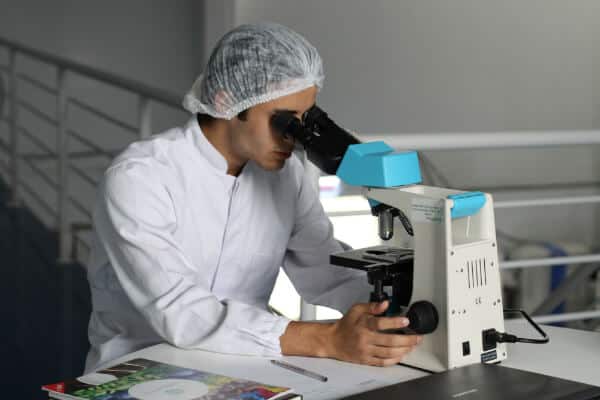
Metformin works to upregulate what’s called the AMPK pathway which is very good that’s what fasting upregulates and caloric restriction upregulates. Rapamycin works on a pathway called mTOR. An mTOR pathway is a negative one. If you’re young and growing, the mTOR pathway is very good, it helps you to grow, but then when you reach maturity, mTOR changes hats, and becomes our enemy—wants to destroy us, wants to get rid of us so that we’ll die young and there’s room for the younger people. 30 or 40 thousand years ago, they have enough calories, once again this is part of our genetic code, our genetic software that needs an update. We don’t have the ability today to update it, although I think with the new technologies, in the near future, what we can do is we can modify the expression of that mTOR negative pathway. Rapamycin is an mTOR inhibitor, so by taking low doses of Rapamycin on an intermittent basis, we can get the benefits of inhibiting the mTOR leading to increases of life expectancy without any real significant side effects.
People that take Rapamycin need to be monitored carefully, that’s something that really should be done under the care of somebody, a physician that has a lot of experience with this because there are potentially some side effects mTOR does as an anti-rejection drug. It does suppress parts of your immune system, makes people less susceptible to viruses more susceptible to bacteria. Certain things have to be watched and it needs to be followed carefully. Combining Rapamycin with Metformin seems to have synergistic effects. Combining Rapamycin with Metformin and Resveratrol—the red wine extract—seems to have synergistic effects.
We’re now looking at a number of supplements and medications that we can repurpose. In other words, taking Rapamycin which is design as an antirejection drug, and taking Metformin which is designed as a diabetes drug, and putting them together, and coming up with something that actually increases our longevity. I think we can now begin to reprogram our biochemistry to a degree that it starts to overcome this outdated genetic code from the Stone Age that really doesn’t want us to be more than 30 years or so. We are now living into our 70s, 80s, 90s, and beyond. I think, first of all, with these interventions we’re going to be able to move the longevity beyond the 80s, 90s, into the 100s and beyond. Also, our healthfulness will move that also to the right as well. They talk about 60 is the new 40, well, I think they start to talk about 80 is the new 50. We’ll just keep pushing that curve more to the right, and people will be living much longer and also much younger longer.
That’s exciting. This concept of having longevity escape velocity I think that’s maybe addressed in the Fantastic Voyage book, as the subtitle of it is, Live Long Enough to Live Forever. What exactly does this longevity escape velocity mean and can you actually live forever? Currently, you can’t, but is this feasible in the future?
I do think it’s feasible in the future. The term Live Long Enough to Live Forever, which was the subtitle of Ray and my book Fantastic Voyage, that was our term and what we meant to say is we don’t know how to live forever right now, but we think we’re going to be able to know that in the near future. All we have to do is live long enough to take advantage of the technologies, and we think they’re going to occur later in the century. We have to live long enough so that then we could take advantage of the technologies, which will enable us to live these extremely long periods of time. The actual term, longevity escape velocity, I think was another Aubrey de Grey phrases.
I think it’s kind of like a leapfrogging. We’re now taking medicine and biology which used to be a very analog type science. Scientists would go to Amazon, they would go back with a bunch of insects, herbs, and flowers, and whatnot and they will try them out. “Does this one kill bacteria? Is this one good for killing cancer?” It was all kind of trial and error method. Now, we can program a computer to do this for us, so we can do intelligent drug discovery and things. Things are going very rapidly. If we can live 10 more years, just think about what’s going to be available 10 years from now that’s not available today. Then, were at the 10-year mark think what’s available in the next 10 years, so it’ll just be a matter of leapfrogging into the future to where it will be possible to live. I think, forever because when we reach the point that we’re able to download our consciousness and our memories to some kind of digital back up, I kind of regard that as immortality.
I mean, as long as somebody’s around to keep the electricity, keep the lights on, we should be able to live for an indefinite period of time. I think that will be possible. I don’t know if it’ll be possible within the wetware of our human body, but I think it’ll be available certainly in the digital capacity. Then if it’s available digitally, we could certainly create or clone another body, and download that consciousness memory into that.
From a spiritual standpoint, this may be a question for another episode but would that even be you if it’s another body and it’s a download of your consciousness? Who knows? I don’t know if you can answer this.
All I can say is, it’s a very good question you asked and wouldn’t it be fun to be able to find out.
You mentioned Resveratrol as a part of this kind of potential trifecta with Rapamycin and Metformin. What does Resveratrol do? I know it comes in red wine, I don’t like red wine so I don’t probably get much resveratrol in my diet. What’s the benefit?
It’s better to know the possible diseases that you might have because if you know, you can do something about it. Share on XIt seems to have a lot of longevity promoting things, it seems to work in the same pathway with that AMPK that metformin works on as well. It’s in the general family what they call sirtuins. Sirtuins act on this another pathway called CRT. It has a lot of benefits but it’s interesting that you mentioned red wine because if we were having this conversation last year, I would’ve said, “You know, drinking one or two glasses of red wine a day has been shown to increase longevity and has a lot of health benefits. In fact, people who don’t drink at all, don’t live as long as people who drink one or two drinks a day. Therefore, we should be drinking a little bit.”
Well, the nice thing or the not nice thing about being a doctor and in being in science is you keep getting the rug pulled out from under you. The latest studies have shown that actually there is no health benefit with any amount of alcohol. Not one drink a week, not one drink a day. That is like smoking cigarettes, there are basically no health benefits. They’ve likened one glass of wine, which is like a five-ounce glass of wine, is equal to about 1 ½ cigarette in terms of its detriments to your health.
Whereas we used to think that modest drinking was beneficial to your health, this curve where you live longer if you drink a little bit probably has nothing to do with the alcohol, it’s in spite of the alcohol. It’s more the kind of people who drink modestly, they’re maybe the kind of people that are more relaxed in their lifestyle, they have more self-control, therefore, they make wiser lifestyle choices than people who drink a lot, who maybe don’t make such good lifestyle choices. Also, people who don’t drink at all, maybe they’re a little bit more tensed and anxious and things like that. Bottom line, we don’t think alcohol is good for anything anymore as far as longevity.
It’s more of a correlation and causation.
Exactly.
Interesting.
I wanted to get back to what we talked about before about the two big killers—heart disease and cancer. We talked a bit about prevention and we hinted a little bit about early detection. There are a couple of things that people can do now that I’d like to mention. They’re very inexpensive. For heart disease, we now can do what’s called ultrafast CT scan, a CT scan of the heart. This is able to detect calcified plaque in the arteries of the heart at its earliest state even if you have a speck of it. I generally recommend that men when they’re about 40, and women when they’re about 50, should get a baseline of one of these.
60% of people will have a zero score; they’ll have none at any age. It’s worth checking. If you have a zero score, then you don’t have to do it again for five years. But if you do it when as a man at 40 or 45, and you find out you have just a little bit of this calcified plaque in your heart, that means that you have got a problem. You shouldn’t have any. You could begin to take corrective action in terms of really modifying your diet. Maybe ketogenic diet with lots of fat isn’t the best diet for you, maybe you should be looking more at the whole foods plant-based diet. Based on the information that you find, you could make very rational, data-driven lifestyle choices. I’m using this test, which in Denver, where I live, is available for $99 and takes five minutes. I think that we should be really looking at using this technology.
As far as cancer grows, there are now machines that are able to detect what is called circulating cancer cells. Anytime there is a tumor, it’s shedding cancer cells in the bloodstream at any time. The technology is now so accurate it can pick out one circulating cancer cell. We can do this test now that either looks for circulating cancer cells. Cancer is associated with mutations and DNA, they can pick up these mutations. We’re now able to detect a couple dozen of the most common cancers. I’m talking about prostate cancer in men, breast cancer in women, colon cancer which is the leading cause in both sexes, thyroid cancer, pancreatic cancer, stomach cancer, esophageal cancer, melanoma, the list goes on and on. We can pick these up now when they’re the size of a pinhead with a simple blood test. I think this has been become more and more the norm and going to actually have a very destructive effect on the current practice of medicine in terms of the way we do things now. In terms of breast cancer screening, prostate cancer screening, colon cancer screening. I think that we’re approaching the point of start to trek one where we could just simply do a simple test and find out if we have heart disease or cancer.
There’s so much learning right now. So, it’s a wonderful time to be alive, to be a doctor and to be a patient. Share on XThe medical tricorder. I’m going to go in for Health Nucleus check at the end of this week. I’m going to Human Longevity Inc. It’s a company, I think, that’s partly owned by Peter Diamandis.
I know that it was started by Craig Venter. I don’t know it’s current ownership, but I’ve been there—not as a patient—but just to see what they’re doing. They have some very interesting things. They do total body MRIs, they do full genome sequencing, and they provide a lot of interesting information for people. I’m sure you’ll learn a lot from your experiences there.
I’m excited. A little nervous, but I’m also excited. Hopefully, they don’t find anything.
You know what they say, “Don’t take your temperature, you won’t find a fever” I think it’s better to know because if you know you have things, you can do something about it.
What about C-reactive protein? That’s something that I remember you talked about when you spoke at Convergence. What should our listeners know about that?
C-reactive protein or CRP is a measure of inflammation. When we look at things like cholesterol levels and heart attacks, there’s not really a linear relationship between them. You have a lot of people who have low cholesterols and end up having a heart attack. Conversely, there’s a lot of people have high cholesterol levels and low risk of heart attacks. We do know that if you have a really low cholesterol level your risk of heart attack is pretty low, but beyond the ultra-low levels, there just seems to be like a scattergram there. What seems to be the most consistent factor is if you have inflammation in your body. We can measure inflammation by doing this test simple blood test called CRP.
If you have elevated CRP levels, you have a lot of inflammation in your body, and inflammation will then be able to inflame that plaque that’s inside the arteries of your heart, which we can find by doing that ultrafast CT scan. If you happen to have that, and you inflame it, then it might rupture leading to a heart attack or stroke, and then you know that’s obviously a major health risk. Measuring your CRP levels is one of the important tests that people could do. It’s not an expensive test, a simple blood test that people can do. I think that that’s something well worth adding to the routine test people should be doing.
The interesting thing, one of the greatest causes of elevating, I say, the most common causes I’ve seen for elevated CRPs is excess body fat. People don’t realize that fat is actually an endocrine organ. In other words, an endocrine organ secretes hormones. Just like your thyroid, secretes thyroid hormones, and your pancreas secretes hormones, digestive enzymes, your body fat secretes hormones too. If you have a small amount of body fat, you tend to secrete the helpful hormone, non-inflammatory hormones. If you have a lot of body fat, you tend to secrete inflammatory hormones. Since we know that inflammation is one of the risk factors for heart disease, cancer, Alzheimer’s, you name it. All these bad things that can happen to you, there’s another reason why it’s so important to try to get rid of excess body fat.
You mentioned cholesterol and this kind of scatter graph thing of not being able to directly correlate cholesterol levels unless they’re ultra low with health benefits and high cholesterol with a risk of heart disease. I understand that there are two types of cholesterol—the “bad” cholesterol and the “good.” LDL is the bad cholesterol, supposedly. The effect of it depends on the particle size. In my understanding of this is, the smaller particles of LDL are more damaging because they wedge into the epithelial wall in your arteries and that starts the plaque formation.
Exactly. Back in the old days, let’s say, our great grandfathers’ way of looking at things. We just looked at the cholesterol level. When I started out as a doctor 40 years ago, normal cholesterol was anything under 350, which nowadays, is regarded as “Oh my gosh, it’s scary.” But honestly, when I look at lab reports from back in 1980—when I started out to be a doctor—I see lab reports, I say, “As long as it’s under 350 it’s normal.” That’s all I looked at. Then going from great grandfather to grandfather they started to break it down into types of cholesterol. LDL being the “bad” cholesterol and HDL being the “good” cholesterol. Well, we have a lot of people that have high HDL levels, low LDL levels, and they still have a heart attack. Even that wasn’t the answer. Then, they started to look at the composition, now we’ve gone from our great grandfather to grandfather to our fathers.
Now our fathers’ generation of cholesterol, we look at the LDL particles and HDL particles. We look at the particle size. With LDL, if the particles are small they tend to be dense and sticky, so we call them B particles. B-LDL particles, when they circulate to the bloodstream, they’re kind of like paintballs they hit the walls of the arteries and they deposit their cholesterol there creating problems. The large particles that you referenced, we call A particles are kind of like ping pong balls, they’re light, they circulate through the bloodstream, they hit the wall of the artery, and they bounce off. It’s now a simple routine blood test to find out what size of particles you have. That’s our father generation of cholesterol analysis.
In our generation of analysis, we take it even a step further and we find out if the cholesterol we have, that LDL cholesterol, is oxidized or not because if it’s oxidized, it’s really dangerous. We can now do a test to find out if it’s in the oxidized state or not. We’re evolving at how we look at cholesterol metabolism and things like that. Learning more over time.
The oxidized version, is that a simple blood test as well or do they have to do NMR?
It’s a simple blood test, but it’s a more expensive blood test. Just like everything, right now it’s a little more expensive, in a couple of years it would be routine and very inexpensive.
We just very briefly referenced what the health nucleus check. They do a whole genome sequencing—almost all—like 95% of my genome will be sequenced and the end of this week, which is exciting. You can see in the genome sequencing, things like genes for APOE and that was one I remember you talked about APOE and Alzheimer’s risk when you spoke at Convergence. Can you talk a bit about that?
The good news about our genes is they mostly just represent tendencies. Most genes—with a few exceptions, maybe less than 5%—95% of genes just say you’re a little bit more predisposed to something than someone else. There are these 5% exceptions that they are a really big deal. One of them happens to be this carrier protein for cholesterol called the APOE. APOE carries cholesterol in our bloodstream.
APOE comes in three varieties, APOE 2, APOE 3 and APOE 4. If we go back to the Stone Age— which is a really good starting point for understanding where we are today—everybody had two copies of APOE4. APOE 4 is the one that increases our risk of Alzheimer’s disease. If you have two copies of APOE 4, you have a 55% chance of getting Alzheimer’s disease, which is a disaster. But 40,000 years ago, having two copies of APOE 4 was a wonderful thing to have. It increases your possibility of survival because of increased inflammation. If you got cut, if you got scratched by a saber tooth tiger, you didn’t have soap and water, you didn’t have antibiotics, the only way that you’re going to survive the possibility of infection was because your body created an inflammatory response to that. You have a lot of inflammation. APOE 4 gave a lot of inflammation and you were able to survive.
As time went along and we become more civilized, we’ve developed running water, we learned about soap, and things like that. It turned out that having all this inflammation wasn’t that great a thing. There was a mutation in APOE 4 and it turns in APOE 3. If you happen to have two copies of APOE 3 your risk of Alzheimer’s disease drops from 55% to 9%, so not having all the inflammation is really a good thing. 60% of the population now has two copies of APOE 3.
Move forward to the present time, there’s been an even further evolution of APOE. Now, there’s this thing called APOE 2 which is protective against Alzheimer’s disease. If you happen to have one or two copies of APOE 2, this is associated with even greater than average longevity. We’ve gone from a 100% being APOE 4, which today is a very high risk of Alzheimer’s, to 60% today APOE 3, a copy of one from the mother and a copy of one from the father.
Bottom line is if you have one copy of APOE 4 your risk of Alzheimer’s is tripled. It goes from 9% to 27%. A lot of people don’t want to know, if they have this APOE4 gene because, “Wow. I’m triple the risk of Alzheimer’s than if I didn’t have it.” I think it’s worth knowing because if you know you have it, we are now learning a lot of what we thought before that Alzheimer’s is caused by the build-up of beta-amyloid plaque in your brain. All of these drugs that have come out to get rid of the beta-amyloid plaque had been a colossal failure and the reason is the beta-amyloid plaque is not the cause of Alzheimer’s disease. It’s a consequence of the inflammation that causes the beta-amyloid plaque to accumulate.
Now, we are looking at things that we can do to avoid the build up. There are certain dietary things that we can do. There are certain lifestyle things that we can do. There are certain supplements we can take, medication we can take, etc. That is going to reduce our risk of Alzheimer’s. I think it’s sensible for people to get tested for this APOE gene made sure they don’t have a copy of APOE 4. If they do, then there’s a number of books that are on the market today that will tell them things that they can do, to really drop the risk down to a small fraction of what they are otherwise.
I recently learned about the implications of gingivitis and bad oral hygiene with the likelihood of getting Alzheimer’s.
We could have a very lengthy discussion on the connection between gingivitis, which is the most common form of infection that is known and its health consequences. There’s such a strong dental connection with human health and also with Alzheimer’s. There’s a connection between the herpes virus and Alzheimer’s. It’s just there’s so much we’re learning and it’s a wonderful time to be alive, a wonderful time to be a doctor, it’s a wonderful time to be a patient.
There’s so much we didn’t get to cover. We didn’t delve into sleep or we didn’t go much into exercise, but if you’re game we’ll have you back at some point, we can delve into some of those topics. If somebody wanted to work with you, your practice, or learn from you, where should they go to start that process?
I’ll give a couple of places. We have a website, grossmanwellness.com and also, our phone number is 303-233-4247.
Awesome, thank you, Terry. Thank you, listeners. Now take some action and apply some of these in your life so that you get a lot more healthy years ahead of you. We’ll catch you on the next episode of Get Yourself Optimized. This is your host Stephan Spencer signing off.

